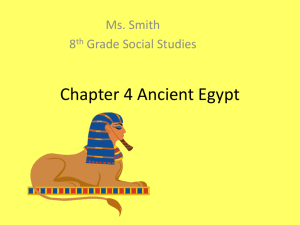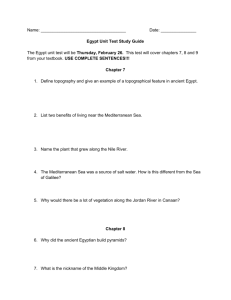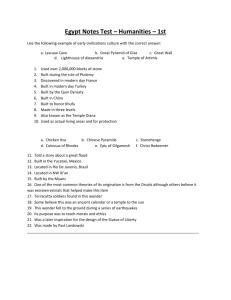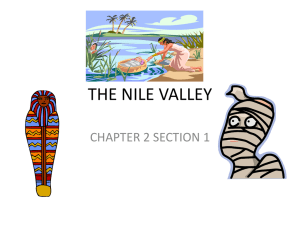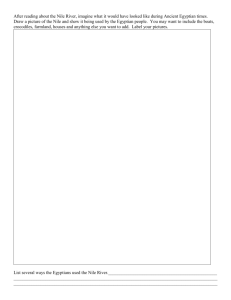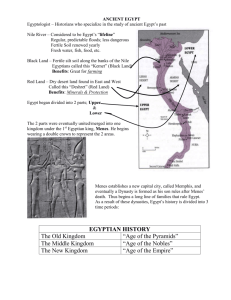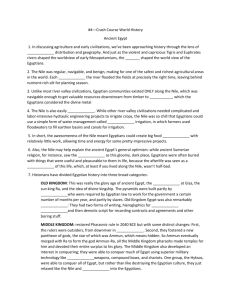apwh crash course egypt
advertisement
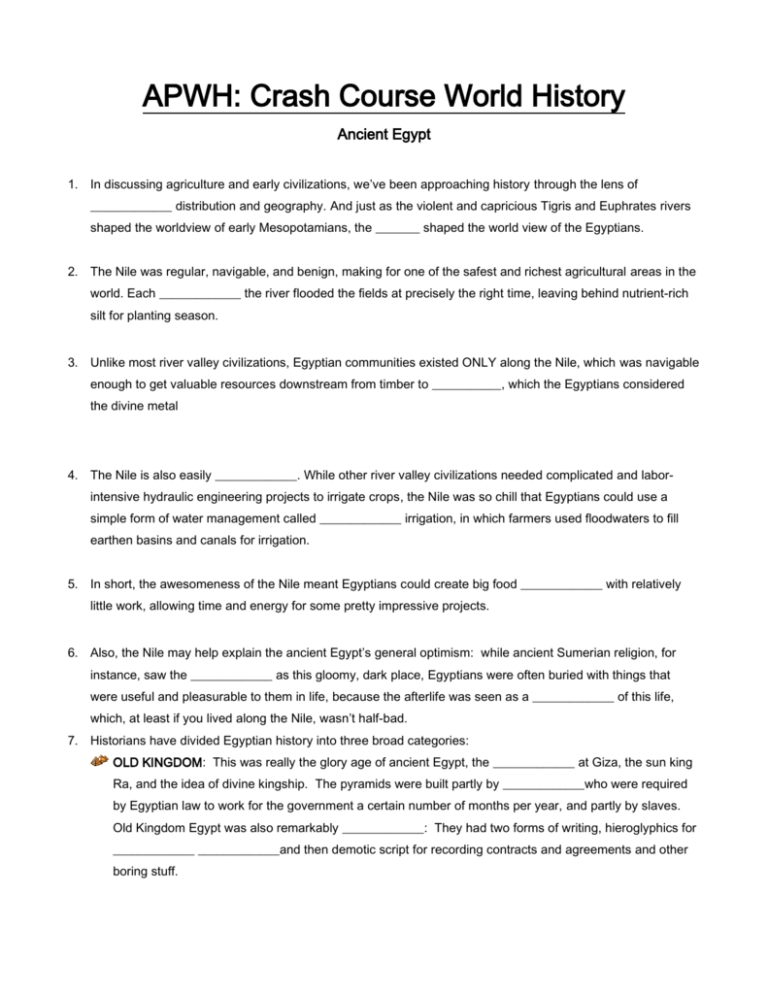
APWH: Crash Course World History Ancient Egypt 1. In discussing agriculture and early civilizations, we’ve been approaching history through the lens of _____________ distribution and geography. And just as the violent and capricious Tigris and Euphrates rivers shaped the worldview of early Mesopotamians, the _______ shaped the world view of the Egyptians. 2. The Nile was regular, navigable, and benign, making for one of the safest and richest agricultural areas in the world. Each _____________ the river flooded the fields at precisely the right time, leaving behind nutrient-rich silt for planting season. 3. Unlike most river valley civilizations, Egyptian communities existed ONLY along the Nile, which was navigable enough to get valuable resources downstream from timber to ___________, which the Egyptians considered the divine metal 4. The Nile is also easily _____________. While other river valley civilizations needed complicated and laborintensive hydraulic engineering projects to irrigate crops, the Nile was so chill that Egyptians could use a simple form of water management called _____________ irrigation, in which farmers used floodwaters to fill earthen basins and canals for irrigation. 5. In short, the awesomeness of the Nile meant Egyptians could create big food _____________ with relatively little work, allowing time and energy for some pretty impressive projects. 6. Also, the Nile may help explain the ancient Egypt’s general optimism: while ancient Sumerian religion, for instance, saw the _____________ as this gloomy, dark place, Egyptians were often buried with things that were useful and pleasurable to them in life, because the afterlife was seen as a _____________ of this life, which, at least if you lived along the Nile, wasn’t half-bad. 7. Historians have divided Egyptian history into three broad categories: OLD KINGDOM: This was really the glory age of ancient Egypt, the _____________ at Giza, the sun king Ra, and the idea of divine kingship. The pyramids were built partly by _____________who were required by Egyptian law to work for the government a certain number of months per year, and partly by slaves. Old Kingdom Egypt was also remarkably _____________: They had two forms of writing, hieroglyphics for _____________ _____________and then demotic script for recording contracts and agreements and other boring stuff. MIDDLE KINGDOM: restored Pharaonic rule in 2040 BCE but with some distinct changes: First, the rulers were outsiders, from downriver in _____________. Second, they fostered a new pantheon of gods, the star of which was Ammun, which means hidden. So Ammun eventually merged with Ra to form the god Ammun-Ra, all the Middle Kingdom pharaohs made temples for him and devoted their entire surplus to his glory. The Middle Kingdom also developed an interest in conquering; they were able to conquer much of Egypt using superior military technology like _____________weapons, compound bows, and chariots. One group, the Hyksos, were able to conquer all of Egypt, but rather than like destroying the Egyptian culture, they just relaxed like the Nile and _____________ into the Egyptians. NEW KINGDOM: Anyway, after all this conquering and being conquered, Egypt eventually emerged from its geographically imposed _____________ New Kingdom Egypt continued this military expansion but it looked more like an empire, particularly when they headed south and took over land in an attempt to find _____________ and _____________. 8. Probably the most expansive of the New Kingdom pharaohs was Hatshepsut, a _____________ who ruled Egypt for about 22 years and who expanded Egypt not through military might, but through _____________. 9. But most new kingdom pharaohs being dudes, focused on _____________ expansion, which brought Egypt into conflicts with the _____________, and then the Persians, and then _____________ the Great and finally, the Romans. 10. New Kingdom Pharaoh Akhenaton tried to invent a new _____________ for Egypt, Aten. After his death he was replaced by his wife, and then a daughter and then a son, _____________, who turned his back on the weird god Aten. And that is about all King Tut did before he died...probably around the age of 17. Honestly, the only reason King Tut is famous is that most Pharaohs had their graves robbed by ancient people; and King Tut had his grave robbed by 20th century _____________ people. Since the tomb was discovered in _____________, technology has established that Tut probably died of an infected broken leg and/or malaria. 11. King Tut leads us nicely to the really crucial thing about Egyptian culture. Because King Tut lived right around the same time as the pyramids right? Wrong. Remember the pyramids were built around 2500 BCE during the ____ _________. King Tut died in 1322 BCE, 1200 years later! But because Egypt was so similar for so long, it all tends to blend together when we imagine it. 12. Ancient Egypt lasted 1000 years longer than _____________ has been around, and about 800 years longer than that other super-long lived civilization, _____________. So there was an entire culture that lasted longer than Western Civilization has existed and it had run its course before “the West” was even born. How did the Nile affect the worldview of Egyptians? Give specific examples as to how they saw life differently than the Mesopotamians and what evidence we have of that. Provide a basic explanation as to how the Old, Middle and new kingdoms differed. What was the “purpose” of each era and how were the leaders different?

